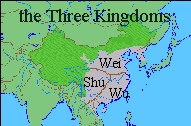event history of Wu 吴

Clicks on me to examine in detail
The potentates of the lower Yangtse area, the Sun clan under the guidance of Sun Ce 孙策 and his brother Sun Quan 孙權, managed to control the whole area south of the Yangtse down to the north of modern Vietnam, as well as north of the Yangtse until the area of the River Huai 淮河 (north of modern Jiangsu Prov.).
In 222, Sun Quan proclaimed himself emperor of Wu (name of an old state of the lower Yangtse area) and was therewith the third power in a divided China.
He shifted his residence from Wuchang 武昌 (modern Echeng 鄂城/Hubei Prov.) to Jianye 建業 (modern Nanjing).
At the begin of his rule, Sun Quan tried to rely on the aristocracy of the River Huai 淮河 area, but he could not but cooperate and arrange with the local gentry (shizu 士族) of the territory southeast of the lower reaches of the Yangtse (Jiangdong 江東 triangle; south of modern Jiangsu Prov. and north of Zhejiang Prov.).
In order to invigorate economy, agriculture and military power, large farmlands were opened in the lower and middle Yangtse area, and Sun Quan tried to obtain cheap workforces from the Non-Chinese montagnard people of modern Zhejiang and Fujian Provinces.
Military campaigns to Yizhou 夷洲 (modern Taiwan) and Liaodong 遼東 (modern Liaoning Prov.) ended in military desasters.
Nontheless, there existed intensive economical contacts with countries in East Asia (Kogury? 高句麗/Korea and the Wa 倭 states of Japan), Southeast Asia (Linyi 林邑, Funan 扶南 in modern Vietnam and Cambodia), and even to India (Tianzhu 天竺) and the near east (Daqin 大秦).
In order to secure his own rule, Sun Quan granted the mighty clans of the large land estate owners of the lower Yangtse area wide privileges.
They were exempted from certain taxes, had special economical and military rights, and were allowed to manage large households with thousands of clerks, bondsmen and quasi-slaves.
Yet not to lose the grip on these almost self-governed communities, wives and sons of this aristocrats had to be sent to the capital as hostages, and certain officials had the task to control this gentry.
Often, gentry clans fought for their political independence from the court at Jianye.
Succession struggles between Sun Quan’s sons Sun He 孙和, and Sun Ba 孙霸, led by court fractions, were finally decided in favour of Sun’s youngest son Sun Liang 孙亮 who was controlled by Zhuge Ke 諸葛恪and his opponent Sun Jun 孙峻 after Sun Quan’s death.
Later, Sun Lin 孙綝 was able to depose Sun Liang to the title of King of Guiji 會稽, and to enthrone Sun Xiu 孙休.
The empires of Cao-Wei and Shu-Han were already destroyed by Sima Yan 司馬炎, when chancellor Puyang Xing 濮陽興 and general Zhang Bu 張布 installed the young Sun Hao 孙皓 (later called Marquis of Wucheng 烏程) as emperor of Wu.
Having lost the political and military grip on his own empire, Sun Hao submitted to Sima Yan, the new emperor of Jin 晉, in 280.